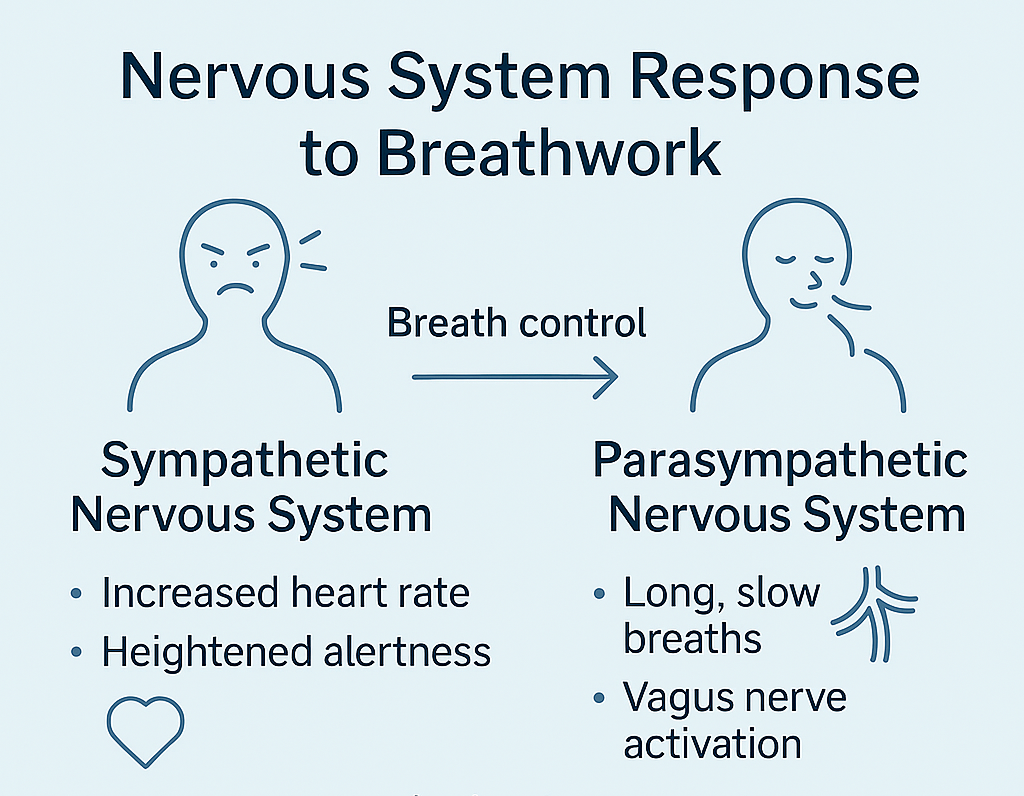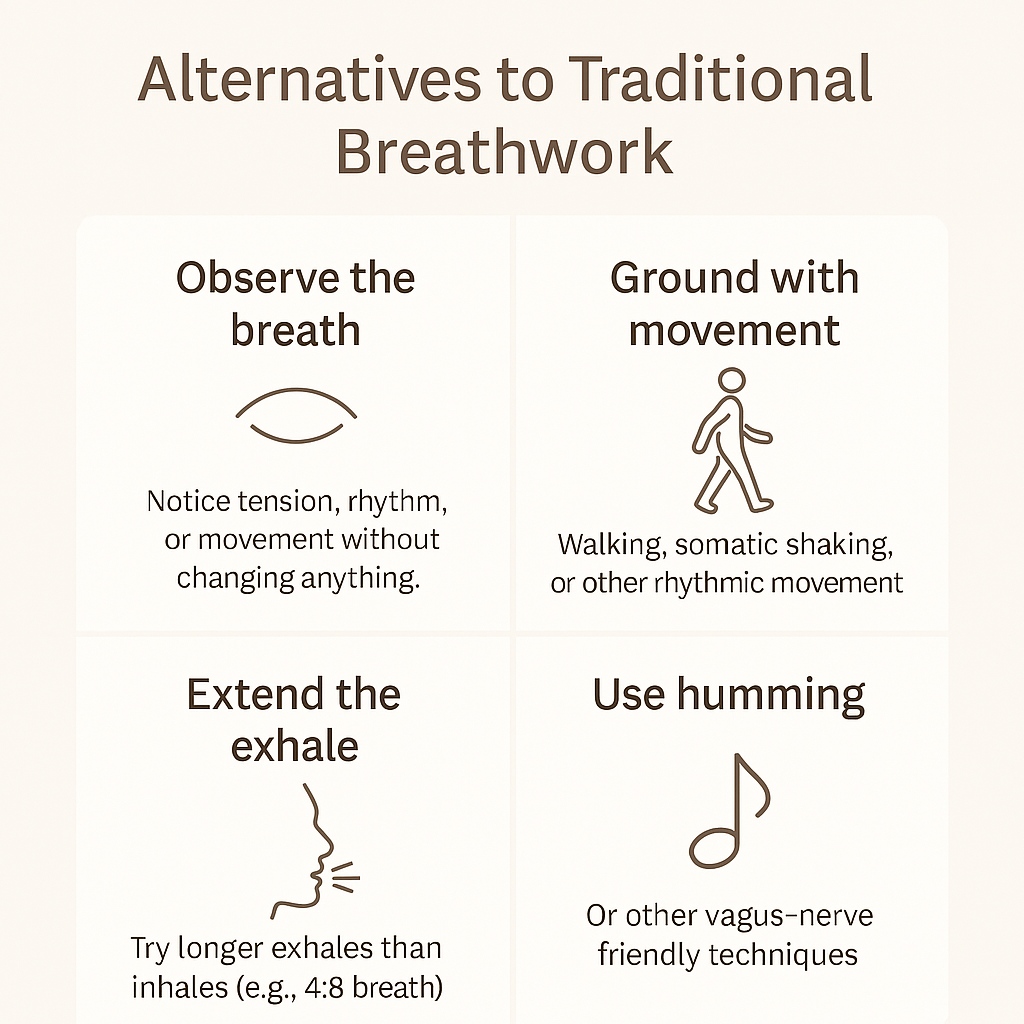When Breathwork Backfires: Why It Doesn’t Work for Everyone (And What to Try Instead)

Breathwork has become a go-to tool for improving stress, recovery, and mental clarity. It’s often promoted as universally effective — but for some, the experience is anything but calming. If breathwork leaves you feeling anxious, overwhelmed, or physically uncomfortable, you're not alone.
At Breath Science Lab, we specialize in evidence-backed tools for parasympathetic recovery. And we know breathwork isn’t a one-size-fits-all practice. In fact, if your nervous system is dysregulated or trauma-impacted, jumping into breath control may do more harm than good.
This post explores why breathwork may not be working for you — and what alternatives might help.
🔬 What the Science Says About Breathwork
Clinical research supports breathwork as a therapeutic tool for emotional regulation, stress reduction, and autonomic balance. Controlled breathing can improve heart rate variability (HRV), reduce anxiety symptoms, and stimulate the vagus nerve.
Meta-analyses and systematic reviews confirm its usefulness in both clinical and non-clinical populations. However, the same research also emphasizes that outcomes vary depending on baseline nervous system state, trauma exposure, and delivery method.

⚠️ Why Breathwork Might Make You Feel Worse
1. A Hyperactive Nervous System Isn’t Ready to Slow Down
When your system is stuck in fight-or-flight, even slow breathing can feel threatening. The body interprets stillness as vulnerability, making relaxation feel unsafe.
2. Breath Awareness Can Trigger Somatic Flashbacks
For individuals with unresolved trauma, bringing attention to internal sensations — especially breath — may evoke discomfort, disconnection, or overwhelm.
3. Low CO₂ Tolerance May Lead to Panic or Dizziness
Many breath practices require a certain level of carbon dioxide tolerance. If your threshold is low, techniques involving breath holds or long exhales can feel suffocating or dysregulating.
4. Generic Instructions Don’t Match Personal Needs
Most breathwork content online offers universal instructions. But without context — nervous system readiness, trauma history, physiology — these techniques may be mismatched to your actual state.
🧭 What to Do Instead: Personalized Recovery Alternatives
✅ Start with Observation, Not Control
Instead of manipulating your breath, begin by noticing it. Track tension, rhythm, or movement — without changing anything. This builds tolerance and interoceptive trust.
✅ Use Grounding and Gentle Movement
Breathless modalities like trauma-sensitive yoga, somatic shaking, or walking with rhythm can regulate the nervous system without breath control.
✅ Try Low-Demand Breath Techniques
If you’re ready to gently reintroduce breath-focused practices, use:
- Extended exhalations (e.g., longer exhales than inhales)
- Nasal breathing with humming
- Non-rhythmic, sensation-based belly breathing

Not Sure If Breathwork Is Right for You Today?
Download the free Nervous System Reset Checklist to assess whether your system is ready for breathwork — or needs something gentler right now.
🔁 Alternative Tools for Nervous System Recovery
If breathwork still doesn’t feel supportive, explore these options:
- Progressive Muscle Relaxation (PMR)
Reduces tension through intentional contraction and release sequences. - Mindfulness Without Breath Focus
Builds awareness of external sensations or sounds instead of internal breath. - Somatic-Based Approaches
Techniques like body scans, gentle tapping, or tracking help reconnect with the body safely. - Slow Movement Modalities
Yin yoga, tai chi, and qi gong integrate breath with flow — without requiring precision or retention.
🧠 Final Thoughts
If breathwork isn’t working for you, it doesn’t mean something is wrong — it means your system is speaking clearly. Recovery starts by meeting your nervous system where it is. For some, breath comes later. For others, it’s never the core practice — and that’s okay.
There are many valid paths to regulation. Breath is just one of them.
📚 References
- Scientific Reports. (2023). Review and meta-analysis suggests breathwork may be effective for improving stress and mental health
- Scientific Reports. (2022). Effect of breathwork on stress and mental health: A meta-analysis of randomized-controlled trials
- PMC. (n.d.). How Breath-Control Can Change Your Life: A Systematic Review on Psycho-Physiological Correlates of Slow Breathing
- MDPI. (n.d.). Breathwork Interventions for Adults with Clinically Diagnosed Anxiety Disorders: A Scoping Review

